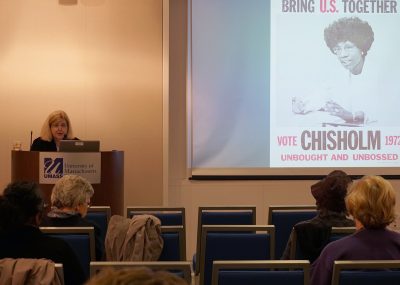
Since 1872, over 200 women have sought the American presidential office. In her book “The Highest Glass Ceiling: Women’s Quest for the American Presidency,” Ellen Fitzpatrick, a history professor at the University of New Hampshire, detailed the struggles of three of the more influential among them: Victoria Woodhull, Margaret Chase Smith and Shirley Chisholm.
Each is credited with a first in the female pursuit of the presidency.
In a talk on Thursday afternoon at the Campus Center of the University of Massachusetts Boston, Fitzpatrick discussed women’s political leadership and the 2016 presidential election.
Nearly 50 years before the ratification of the 19th Amendment, Woodhull became the first woman to seek the presidency. Chase Smith, who cast her bid for the presidency in 1964, was the first woman to have her name placed in nomination by a major political party. Six years later, Chisholm, the first African-American congresswoman, became the first African-American to announce a presidential candidacy.
None of their candidacies were, of course, very successful. Now, the question is, “Why?”
“There is a tremendous amount of sexism and hatred towards women who try to break out of the mold,” said Diane Balser, the co-director of undergraduate studies in the Boston University Women’s, Gender and Sexuality Studies Program. “I think that’s the biggest challenge.”
What exactly has delayed America’s first female president?
Despite being the most successful so far, the campaigns of Woodhull, Chase Smith and Chisholm all crumbled under the weight of pragmatic concerns, such as financing, prior experience and party support. Hillary Clinton, the first female presidential nominee of a major political party, surmounted these obstacles and came far closer to the presidency than her predecessors.
Ironically, Fitzpatrick noted, Clinton’s success in overcoming those issues is what has garnered some of her harshest criticisms — flack for her highly successful fundraising efforts and accusations of being both a “career politician” and “establishmentarian.”
Herein lies what has been called the “Hillary Clinton paradox.” As America’s first female presidential nominee for a major political party, Clinton is, as many say, high-achieving and well-established, yet she is simultaneously criticized for being high-achieving and well-established.
Balser offered a potential explanation for the double standard.
“We don’t desire women to have power,” she said. She added, “I think the tremendous sexualization of women, [in] the media and elsewhere, puts pressure on younger women not to look at politics as a choice.”
Virginia Sapiro, a political science professor at BU, wrote in an email to The Daily Free Press that “the greatest obstacle facing women in attaining political office now is that fewer of them seek political office.”
“Most research shows that in normal situations, women and men are likely to be roughly equally successful if they run for office,” Sapiro wrote. “But the problem is not women’s “fault;”… There are a lot of women (and for that matter men) who very much value their involvement in politics and having a role in creating public policy, but who do not really enjoy what it takes to run for office… Some people who know Hillary Clinton well say she is a good example – she relishing working on policy and politics, but not campaigning.”
Prior to the election, Balser and Sapiro considered the potential impacts of a Clinton presidency. Balser said she was “cynical about much happening,” noting that Clinton’s efficacy is highly dependent upon the composition of her congress. Sapiro wrote that a Clinton presidency would be an opportunity to lead areas toward change.
“I assume she would push forward a number of policy proposals that of interest to feminists that one way or another she has worked on throughout her adult life, as well as some she has come to later,” Sapiro wrote. “She has always been a proponent of strong child and family policy. She is a proponent of more comprehensive parental leave. She would want to see stronger anti-discrimination policies. She is pro-choice. But what she can do depends on Congress, which as a collectivity is responsible for passing legislation, and in some cases the Supreme Court.”
Balser posited that perhaps the biggest impact Hillary Clinton’s election would have had is a symbolic one.
“Just her winning would cause ripples because part of it was standing up to the sexual violence that was directed at her when she ran,” Balser said. “Visually seeing a woman president, we’ll get used to it, but it’s going to take a while.”
To those waiting for a better woman candidate, they “will be waiting a long time,” said Fitzpatrick, citing Clinton’s unique list of qualifications.
She said she finds it hard to imagine another women as qualified as Hillary Clinton seeking the presidency in the future.
“I do have good material,” Fitzpatrick said. Prior to the election, she said “I just don’t want her to be another chapter like the other chapters that have come along.”















































































































